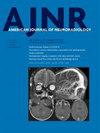血管内血栓切除术后碘对比剂外渗的决定因素和临床意义:双能量 CT 研究
IF 3.7
3区 医学
Q2 CLINICAL NEUROLOGY
引用次数: 0
摘要
背景和目的:碘造影剂外渗(ICE)在血管内血栓切除术(EVT)后急性缺血性卒中(AIS)患者中很常见。我们的研究旨在评估双能 CT(DECT)评估的 ICE 发生率、其决定因素以及与临床结果的关系。材料与方法:我们回顾性地检查了在一个学术中心接受 EVT 治疗的连续 AIS 患者的成像参数和临床因素,这些患者在接受 EVT 治疗 24 小时后接受了 DECT 检查。我们使用单变量和多变量模型探讨了 ICE、临床、成像和手术参数以及临床结果之间的关联。结果:共纳入197例连续患者(时间为2019-2020年),其中53例(27%)表现为ICE,其中30/53例(57%)为纯ICE,23/53例(43%)混合有颅内出血(ICH)。低初始-ASPECTS、高每次手术对比剂注射量和高入院血糖与 ICE 独立相关(分别为 OR = 0.43,95% CI,0.16-1.13,P = .047;OR = 1.02,95% CI,1.00-1.04,P = .003;OR = 8.92,95% CI,0.63-125.77,P = .043)。ICE 与 ICH 独立相关(P = .047),但与较差的临床预后(6 个月 mRS >2,P = .223)无关。单变量分析表明,低 ADC、较高的缺血容量、ICA 闭塞、质量效应、较长的手术时间、联合血栓切除技术、较多的设备通过次数和较低的再通率与 ICE 相关(分别为 P = .002; <.001; .002; <.001; .002; 0.011; <0.001; 0.015)。结论:使用 DECT 评估 ICE 是 EVT 术后比较常见的发现,几乎有三分之一的患者存在 ICE。较低的入院 ASPECTS、较高的血糖和每次手术注入的大量造影剂与 ICE 相关。我们还发现了 ICE 与 ICH 之间的关联,证实了血脑屏障改变是 ICH 的主要决定因素。本文章由计算机程序翻译,如有差异,请以英文原文为准。
Determinants and Clinical Relevance of Iodine Contrast Extravasation after Endovascular Thrombectomy: A Dual-Energy CT Study
BACKGROUND AND PURPOSE: Iodine contrast extravasation (ICE) is common in patients with acute ischemic stroke (AIS) after endovascular-thrombectomy (EVT). The aim of our study was to evaluate the incidence of ICE assessed by dual-energy CT (DECT), its determinants, and associations with clinical outcome. MATERIALS AND METHODS: We retrospectively examined imaging parameters and clinical factors from consecutive patients with AIS treated with EVT who had a DECT 24 hours thereafter, identified at a single academic center. Associations between ICE, clinical, imaging, and procedural parameters, as well as clinical outcome were explored by using univariable and multivariable models. RESULTS: A total of 197 consecutive patients were included (period 2019–2020), of which 53 (27%) demonstrated ICE that was pure ICE in 30/53 (57%) and mixed with intracranial hemorrhage (ICH) in 23/53 (43%). Low initial-ASPECTS, high per-procedural-contrast volume injected, and high admission-glycemia were independently associated with ICE (respectively, OR = 0.43, 95% CI, 0.16–1.13, P = .047; OR = 1.02, 95% CI, 1.00–1.04, P = .003; OR = 8.92, 95% CI, 0.63–125.77, P = .043). ICE was independently associated with ICH (P = .047), but not with poorer clinical outcome (6-month mRS >2, P = .223). Univariate analysis demonstrated that low ADC, higher ischemic volume, ICA occlusion, mass effect, longer procedure duration, combined thrombectomy technique, higher number of device passes, and lower recanalization rate were associated with ICE (respectively, P = .002; <.001; .002; <.001; .002; 0.011; <0.001; 0.015). CONCLUSIONS: ICE evaluated with DECT is a relatively frequent finding after EVT, present in almost one-third of patients. Lower admission ASPECTS, higher glycemia, and high contrast volume injected per procedure were associated with ICE. We also found an association between ICE and ICH, confirming blood–brain barrier alteration as a major determinant of ICH.
求助全文
通过发布文献求助,成功后即可免费获取论文全文。
去求助
来源期刊
CiteScore
7.10
自引率
5.70%
发文量
506
审稿时长
2 months
期刊介绍:
The mission of AJNR is to further knowledge in all aspects of neuroimaging, head and neck imaging, and spine imaging for neuroradiologists, radiologists, trainees, scientists, and associated professionals through print and/or electronic publication of quality peer-reviewed articles that lead to the highest standards in patient care, research, and education and to promote discussion of these and other issues through its electronic activities.

 求助内容:
求助内容: 应助结果提醒方式:
应助结果提醒方式:


